 MyDogBreeds
MyDogBreedsRedbone Coonhound is originated from United States but English White Terrier is originated from United Kingdom. Redbone Coonhound may grow 24 cm / 10 inches higher than English White Terrier. Redbone Coonhound may weigh 23 kg / 51 pounds more than English White Terrier. Redbone Coonhound may live 6 years more than English White Terrier. Both Redbone Coonhound and English White Terrier has almost same litter size. Redbone Coonhound requires Low maintenance. But English White Terrier requires Moderate maintenance
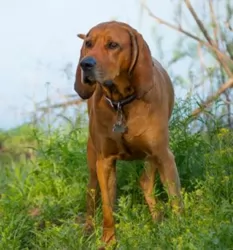 The Redbone Coonhound has always had a busy life hunting bear, deer and cougar. It is thought that this dog descends from from Bloodhounds, Foxhounds and Irish Hounds.
The Redbone Coonhound has always had a busy life hunting bear, deer and cougar. It is thought that this dog descends from from Bloodhounds, Foxhounds and Irish Hounds.
Hailing from America, this dog has been registered with the American Kennel Club since 2009.
It was during the 18th century that many European-type hunting dogs were imported to America. Over time, Southern hunters bred with stamina and this ultimately lead to the emergence of coonhounds.
The English White Terrier was developed in the 1860’s by a group of breeders from the Sealyham terriers, the Jack Russell terrier, and the Fox Terrier. These breeders were looking for a white terrier that could be more successful in the show ring than the current prick-eared English terrier. They named their new breed, the English White Terrier or the Old English terrier. In later years in the United States, the English White Terrier was mixed again with the Rat Terrier and the Old English Bulldog to create both the Boston terrier and the Bull terrier.
Although the breed did not last long it did have a prestigious ancestry that could be traced back centuries in England among ancient terriers. The word terrier was in use in England in 1440, showing that the dogs were well known at that time. Most historians agree that the dogs were even older than the 1400’s. It is believed that terriers who “went to ground” after prey, existed as far back as the time of Christ in England.
Most of these ancestors of the English White Terrier were not white. White terriers came onto the scene around the 1700’s.The first picture of white terriers appeared in 1790 when Sawre Gilpin, a British artist, painted “A Huntsman with Hounds Foxhunting” and the terriers in the painting were white with brown marks. Others began to show the same kind of terriers in their artwork – white coated. Before this it is believed that breeders killed the white terriers at birth because they were often deaf and inferior to the other terriers. In the early part of the 19th century, the white terrier began to be completely white with no markings. The Kennel Club recognized them in 1874 as the White English Terrier.
The breed faced many genetic issues, deafness and the Kennel Clubs felt there was no difference between the current White English terrier and the English White terrier despite the difference in their ears. The new English White Terrier had dropped ears instead of Prick-ears. They considered them to be the same breed and not even different types. They were the smallest of all terriers and considered to be a good pet but not a show dog or a working dog. Because of this it was not very popular, and it actually had been bred to be a show dog and not a working dog. The English White Terrier was not recognized by any Kennel Club and within 30 years it was extinct.
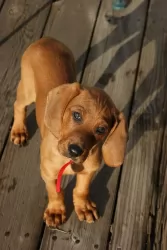 This beautiful, shiny red dog is medium-sized and stands at between 53 and 70cm at the shoulders and weighs between 20 and 32kg.
This beautiful, shiny red dog is medium-sized and stands at between 53 and 70cm at the shoulders and weighs between 20 and 32kg.
The dog’s coat is short and smooth with maybe just a tiny bit of white found around the feet and chest area. He is lean and muscular with strong, straight legs and a deep chest. The ears are floppy and the tail, traditionally docked, is often left long these days.
The paws are large and webbed and when the dog is excited, the tail is held high
The Redbone Coonhound is an affectionate dog who wants to please his owners. He just loves his human family and would be beside himself if he were locked outside day after day.
He is a social dog who should be allowed time indoors and out. They make splendid playmates for children too, and get along well with other animals in the house.
Because they’re independent and strong willed, he will need to be trained and socialized to ensure he is well mannered and obedient.
He is an active dog and will require a good bout of exercise. He is vocal, known for his baying type of bark, and training will keep this kind of baying under control. Training is also necessary as this dog is stubborn. He is intelligent enough to learn, and once trained, is gentle and calm.
The English White Terrier had a pure white coat with no markings of any kind. His coat was short, hard, and glossy and his body was firm, muscular and hard. The breed was small – almost a toy. They had a body like the Manchester Terrier. They had long legs and large feet. The tail was medium size and straight out from the body.
The English White Terrier had a very refined head with a fairly long muzzle. Their bite was even, and their eyes were brown, amber or black. Their ears dropped – unlike the pricked ears of the White English Terrier.
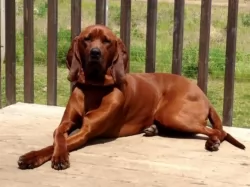 The Redbone loves the company of his human family. He is such a friendly dog,getting on well with everyone in the family, including the children and other pets.
The Redbone loves the company of his human family. He is such a friendly dog,getting on well with everyone in the family, including the children and other pets.
He is a hunting dog and always ready to be part of any activities his human family is involved in. He is gentle and easy going, and and having him in your life is guaranteed to bring in a lot of joy and sunshine.
The English White Terrier was affectionate and devoted to his family. It was the softest tempered of all terriers and made an excellent pet. Some of the English White Terriers were animal aggressive while others were not. Training was difficult because of the wide-spread deafness in the breed. IT loved to be cuddled and held. They were also tenacious and game for any type of fight or hunt despite their size and deficiencies.
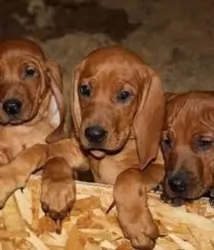 The Redbone Coonhound is generally a healthy breed that can reach 12, 13, 14 years of age if well cared for.
The Redbone Coonhound is generally a healthy breed that can reach 12, 13, 14 years of age if well cared for.
There are some common dog illnesses that this do can succumb to and which are worth knowing about as they affect so many dogs. These are cancer, bloat, skin allergies, ear infections and hip dysplasia.
If you notice that your active dog is subdued and lethargic, it is your responsibility to get your 4-legged child to the vet to be looked over.
The breed was considered to be unhealthy for the most part and became extinct because of this. Many complained that the breed was inbred and had a weak constitution because of it. Deafness was prevalent throughout the breed. This deafness occurs in many white animals, but the English White Terrier had the highest rates among all white dogs.
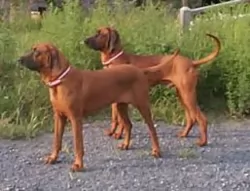 Hunting dogs such as the Redbone Coonhound will need a good deal of exercise to stay happy and healthy. The breed is best suited to the countryside or suburbs as opposed to city dwelling.
Hunting dogs such as the Redbone Coonhound will need a good deal of exercise to stay happy and healthy. The breed is best suited to the countryside or suburbs as opposed to city dwelling.
He won’t be content with just a walk every day but is the kind of dog that will want to be free from a leash and be running far and wide. When at home, involve him in some rope- and ball games.
The Redbone Coonhound isn’t going to be a dog that you have to fuss over. His short coat can be brushed twice a week to keep him looking beautifully shiny. When you brush him, make sure you check for any unusual lumps.
He has floppy ears, so look inside his ears for signs of redness and discharge. This could be an indication of an ear infection. Also check inside his mouth as he could have a rotting tooth which could be causing him a lot of pain and also be poisoning his body.
You want to ensure your beautiful Redbone Coonhound stands every chance to enjoy good health. Every dog owner should try to feed their dog the best food there is.
There are some good commercially manufactured foods on the market and these are wonderfully convenient to use for your dog. However, you want to provide him with some good homemade food too.
Dogs thrive on simplicity and consistency with their diets because then it prevents upset stomachs. Some home-cooked food such as boiled chicken, sweet potatoes, brown rice or pasta, carrots and spinach will be perfect for him.
Chop the food up finely and add it into the dry kibble once or twice a week. Raw meat can also be added in occasionally to promote good skin health. Make sure your pet is never without a constant supply of fresh, cool water.
It was best to feed the English White Terrier 1-2 cups of dry meal per day served in 2 meals.
As mention previously, the English White Terrier was congenitally deaf and had a weak constitution.
This little dog with all its problems was still a very energetic dog and needed considerable exercise. Owners had to develop exercises and games to keep the English White Terrier occupied as with any terrier. If they didn’t have a job or something to occupy their minds and bodies, they were destructive.